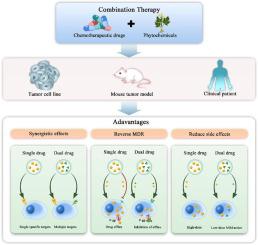Advanced Drug Delivery Reviews ( IF 16.1 ) Pub Date : 2022-07-09 , DOI: 10.1016/j.addr.2022.114445 Quan Gao 1 , Jiao Feng 1 , Wencheng Liu 1 , Chengyong Wen 1 , Yihan Wu 2 , Qian Liao 2 , Liang Zou 3 , Xinbing Sui 1 , Tian Xie 1 , Jinming Zhang 2 , Yichen Hu 3

|
The therapeutic limitations such as insufficient efficacy, drug resistance, metastasis, and undesirable side effects are frequently caused by the long duration monotherapy based on chemotherapeutic drugs. multiple combinational anticancer strategies such as nucleic acids combined with chemotherapeutic agents, chemotherapeutic combinations, chemotherapy and tumor immunotherapy combinations have been embraced, holding great promise to counter these limitations, while still taking including some potential risks.
Nowadays, an increasing number of research has manifested the anticancer effects of phytochemicals mediated by modulating cancer cellular events directly as well as the tumor microenvironment. Specifically, these natural compounds exhibited suppression of cancer cell proliferation, apoptosis, migration and invasion of cancer cells, P-glycoprotein inhibition, decreasing vascularization and activation of tumor immunosuppression. Due to the low toxicity and multiple modulation pathways of these phytochemicals, the combination of chemotherapeutic agents with natural compounds acts as a novel approach to cancer therapy to increase the efficiency of cancer treatments as well as reduce the adverse consequences. In order to achieve the maximized combination advantages of small-molecule chemotherapeutic drugs and natural compounds, a variety of functional nano-scaled drug delivery systems, such as liposomes, host–guest supramolecules, supramolecules, dendrimers, micelles and inorganic systems have been developed for dual/multiple drug co-delivery. These co-delivery nanomedicines can improve pharmacokinetic behavior, tumor accumulation capacity, and achieve tumor site-targeting delivery.
In that way, the improved antitumor effects through multiple-target therapy and reduced side effects by decreasing dose can be implemented. Here, we present the synergistic anticancer outcomes and the related mechanisms of the combination of phytochemicals with small-molecule anticancer drugs. We also focus on illustrating the design concept, and action mechanisms of nanosystems with co-delivery of drugs to synergistically improve anticancer efficacy. In addition, the challenges and prospects of how these insights can be translated into clinical benefits are discussed.
中文翻译:

基于植物化学物质与化疗药物联合给药的纳米药物在癌症治疗中的机遇与挑战
基于化学治疗药物的长期单一疗法经常引起疗效不足、耐药性、转移和不良副作用等治疗局限性。多种联合抗癌策略,如核酸联合化疗药物、化疗联合治疗、化疗和肿瘤免疫治疗联合治疗等已被接受,有望克服这些局限性,但仍存在一些潜在风险。
如今,越来越多的研究表明植物化学物质的抗癌作用是通过直接调节癌细胞事件以及肿瘤微环境来介导的。具体而言,这些天然化合物表现出抑制癌细胞增殖、凋亡、癌细胞迁移和侵袭、抑制 P-糖蛋白、减少血管形成和激活肿瘤免疫抑制。由于这些植物化学物质的低毒性和多种调节途径,化学治疗剂与天然化合物的组合可作为一种新的癌症治疗方法,以提高癌症治疗的效率并减少不良后果。为了实现小分子化疗药物与天然化合物的最大联合优势,已经开发了多种功能性纳米级药物递送系统,例如脂质体、主客体超分子、超分子、树枝状聚合物、胶束和无机系统,用于双重/多重药物联合递送。这些共递送纳米药物可以改善药代动力学行为、肿瘤积累能力,并实现肿瘤位点靶向递送。
以这种方式,可以实现通过多靶点治疗提高抗肿瘤效果和通过减少剂量减少副作用。在这里,我们介绍了植物化学物质与小分子抗癌药物联合使用的协同抗癌结果和相关机制。我们还着重阐述了纳米系统的设计理念和作用机制,通过共同递送药物协同提高抗癌功效。此外,还讨论了如何将这些见解转化为临床益处的挑战和前景。


























 京公网安备 11010802027423号
京公网安备 11010802027423号